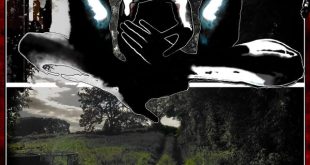There are a lot of 16-year-old singers who go down the pop music path. But there are also a number of them that go somewhere completely different. I am reminded of Montreal’s Nikki Yanofsky a few seconds into listening to Juliette Jules’ EP Black Crow, in which she displays a vocal know-how well beyond her age. Although the musical variety in this album is limited, the talented Jules shines throughout it all. Her mother ensured that she was trained in both classical piano and opera at the ages of eight and 14 respectively, the influence of which is reflected in this collection of songs. Just like with Alicia Keys, Adele, and Chantal Kreviazuk, the universal themes of love, pain, and loss that inspired Jules, as well as the combination of classic and modern elements on the album, will appeal to many ages. Her vocals are rich in texture and nuance, able to convey subtly which add depth to each song.
The rhythmic yet mellow “Johnny Was ” opens the EP with a surprisingly Americana sound, blending in with folk and modern flavours. The melody is simple, guitar-driven with a simple piano and very gentle drum accompaniment. Jules reminds me a lot of Chantal Kreviazuk in this song, both in her voice but also in its overall feel. The theme of simplistic yet beautifully-crafted melodies combining piano and guitar continues in “Black Crow,” a soft ballad where the two instruments seem to be playing some sort of game one with the other, building up to an ear-grabbing symphony-like crescendo. Jules’ vocals easily accompany the instruments, and one can easily hear the passion in her voice. The opening notes of “The Game”, played on the piano, set the tone in very much the same way the opening notes of Adele’s “Turning Tables” do. But Jules takes us in a completely different direction with her guitar, turning the track straight back in Chantal Kreviazuk territory. The almost playful feel of “Johnny Was” and the emotional feel of “Black Crow” give way to a certain vulnerable innocence displayed in this track.
” opens the EP with a surprisingly Americana sound, blending in with folk and modern flavours. The melody is simple, guitar-driven with a simple piano and very gentle drum accompaniment. Jules reminds me a lot of Chantal Kreviazuk in this song, both in her voice but also in its overall feel. The theme of simplistic yet beautifully-crafted melodies combining piano and guitar continues in “Black Crow,” a soft ballad where the two instruments seem to be playing some sort of game one with the other, building up to an ear-grabbing symphony-like crescendo. Jules’ vocals easily accompany the instruments, and one can easily hear the passion in her voice. The opening notes of “The Game”, played on the piano, set the tone in very much the same way the opening notes of Adele’s “Turning Tables” do. But Jules takes us in a completely different direction with her guitar, turning the track straight back in Chantal Kreviazuk territory. The almost playful feel of “Johnny Was” and the emotional feel of “Black Crow” give way to a certain vulnerable innocence displayed in this track.
The penultimate “Hallelujah” is a cover of Leonard Cohen’s song, which Jules manages to stay faithful to while making it her own. I felt that more than the other songs, Jules’ maturity shone through in this cover; after all, it is a very deep, poignant song about profound pain. The vocals are powerful and emotional, well suited to the lyrics, and will probably be acceptable to many a hard core fan of the original version. The album finishes off with the short “To The Mountains,” a dreamy conclusion that returns to the folk sounds of the opening “Johnny Was,” wrapping up an album that features great piano skills, strong guitar handling, nuanced vocals, and touching lyrics. Combined, these reflect a maturity well beyond Jules’ age, as well as a talent that feels honest and real, hopefully marking the beginning of a long and successful career.
Listen to the album on SoundCloud. For more information about Juliette Jules, visit her website or her Facebook page.
[amazon template=iframe image&asin=B00007H044] Blogcritics The critical lens on today's culture & entertainment
Blogcritics The critical lens on today's culture & entertainment



